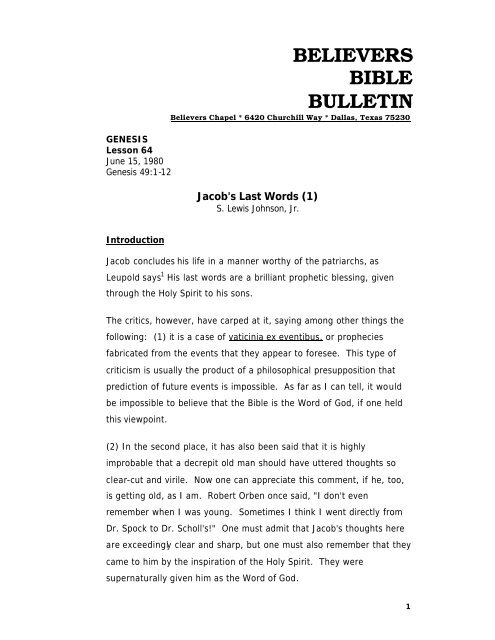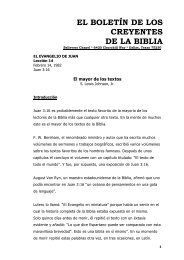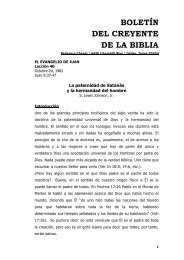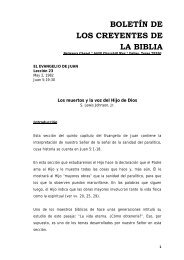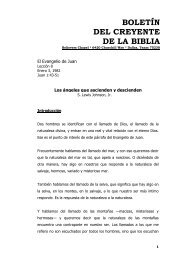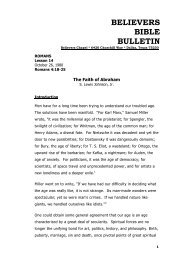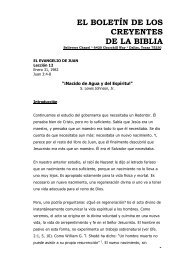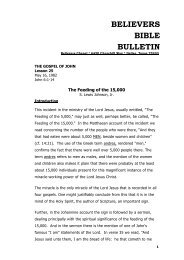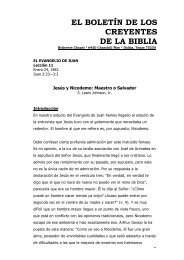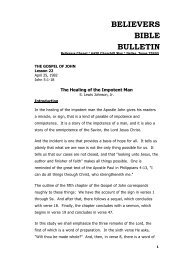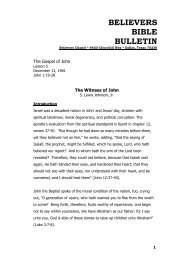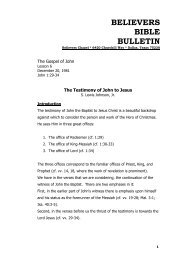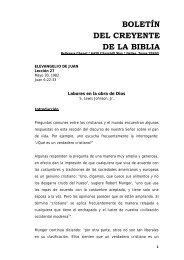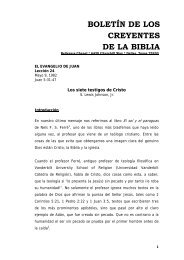You also want an ePaper? Increase the reach of your titles
YUMPU automatically turns print PDFs into web optimized ePapers that Google loves.
GENESIS<br />
Lesson 64<br />
June 15, 1980<br />
<strong>Genesis</strong> <strong>49</strong>:1-<strong>12</strong><br />
BELIEVERS<br />
BIBLE<br />
BULLETIN<br />
<strong>Believers</strong> <strong>Chapel</strong> * 6420 Churchill Way * Dallas, Texas 75230<br />
Jacob's Last Words (1)<br />
S. Lewis Johnson, Jr.<br />
Introduction<br />
Jacob concludes his life in a manner worthy of the patriarchs, as<br />
Leupold says 1 His last words are a brilliant prophetic blessing, given<br />
through the Holy Spirit to his sons.<br />
The critics, however, have carped at it, saying among other things the<br />
following: (1) it is a case of vaticinia ex eventibus, or prophecies<br />
fabricated from the events that they appear to foresee. This type of<br />
criticism is usually the product of a philosophical presupposition that<br />
prediction of future events is impossible. As far as I can tell, it would<br />
be impossible to believe that the Bible is the Word of God, if one held<br />
this viewpoint.<br />
(2) In the second place, it has also been said that it is highly<br />
improbable that a decrepit old man should have uttered thoughts so<br />
clear-cut and virile. Now one can appreciate this comment, if he, too,<br />
is getting old, as I am. Robert Orben once said, "I don't even<br />
remember when I was young. Sometimes I think I went directly from<br />
Dr. Spock to Dr. Scholl's!" One must admit that Jacob's thoughts here<br />
are exceedingly clear and sharp, but one must also remember that they<br />
came to him by the inspiration of the Holy Spirit. They were<br />
supernaturally given him as the Word of God.<br />
1
It is not surprising for men to speak at the point of death in amazingly<br />
clear ways, even when aged. Socrates in his great Apology said, "I am<br />
about to die, and that is the hour in which men are gifted with<br />
prophetic power." And a similar idea is expressed in the lines,<br />
"The soul's dark cottage, batter'd and decayed, Lets in new light<br />
through chinks that time hath made."<br />
Thus, the objection on account of age is not convincing. One of the<br />
strangest objections is this one (3): The twelve sons of Jacob in this<br />
blessing are the twelve signs of the zodiac! These words constitute<br />
Israel's astral myths. One must wander far from sober exegesis to<br />
invent such theories. 2 The blessing is a genuine prophetic blessing and<br />
should be read as such.<br />
Jacob's actions in blessing his sons before his death are very wise.<br />
<strong>Believers</strong> ought to anticipate their death, perhaps even preparing<br />
testimonies for those who survive them, outlining the saving and<br />
guiding grace that God gave them in their lives, with admonitions<br />
regarding the nature of inherited property as that which is held in trust<br />
for the Lord God.<br />
The blessing is beautifully constructed. It has good poetic rhythm,<br />
excellent figures of speech, and apt use of paronomasia. And yet it is<br />
plain and clear. It is both an exalted spiritual composition and a warm<br />
human product. Among the first group of sons, it is Judah who stands<br />
out, and the prophecy of verses eight through twelve is important for<br />
the Messianic program. It is Joseph who stands out in the last half of<br />
the prophecy (cf. vv. 22-26). The midpoint in Jacob's mind seems to<br />
be verse eighteen, a verse of ejaculatory prayer and praise which may<br />
have the Messiah directly in mind.<br />
In this study we are going to look at the first part of the blessing, and<br />
we shall pay special attention to 'its highpoint, the words to Judah,<br />
2
which set him forth as the ancestor of the Lion of the Tribe of Judah,<br />
the Lord Jesus Christ. We turn to the blessing now.<br />
THE EXORDIUM: SUMMONS TO THE BLESSING<br />
The purpose of the call (Gen. <strong>49</strong>:1). The formal nature of the call<br />
to the brethren indicates that Jacob was conscious of the fact that he<br />
was being called by the Lord to take a solemn look into the future.<br />
The expression, "in the days to come" (NASB; AV, "in the last days"), is<br />
a well-known Messianic temporal expression, which almost always<br />
looks into the distant future to the days of the Messiah. In Jacob's<br />
words that follow the perspective appears to gather round the<br />
occupation of Canaan, but his words go beyond that. That is clear<br />
from verse ten. We must conclude, then, that Jacob's words touch not<br />
only the more immediate future but also the distant future as well. His<br />
words are similar to other prophetic words in the Old Testament, when<br />
the prophet's perspective embraces both the near and far future in the<br />
same context, the words moving from the one to the other without a<br />
clear expression of their temporal distinctions.<br />
The plea to listen (Gen. <strong>49</strong>:2). The double exhortation to give<br />
attention to the patriarch's words lays stress upon the importance of<br />
the words. They are doubly important.<br />
THE BLESSING OF REUBEN<br />
Reuben's calling (Gen. <strong>49</strong>:3 ). Reuben by the providence of God was<br />
the firstborn, possessed of the rights of the position naturally. These,<br />
however, he lost by virtue of the sin he committed (cf. 1 Chron. 5:1-2).<br />
Reuben's collapse (Gen. <strong>49</strong>:4). What a horrible contrast is seen<br />
here between one's calling and one's condition, and the sin of 35:22<br />
underlines it. There is a withering contrast between the majestic<br />
phrases of verse three and ignominious collapse set forth in verse four.<br />
And, as Kidner points out, it would be hard to find a less flattering<br />
account of a grand passion. 3<br />
3
The description of Reuben's collapse is found, first, in the expression,<br />
"uncontrolled as water" (cf. v. 4). The metaphor, which literally means<br />
something like boiling over like water, suggests a certain seething of<br />
lust, an unbridled license. The result is an evaluation of Reuben that<br />
pointed to both wildness and weakness, an undisciplined life.<br />
The last words of verse four, "he went up to my couch," are very vivid.<br />
The order of the words in the original text lays emphasis on the<br />
astonishing wantonness of the act. "To my couch he went up!" And<br />
the change of the person from the second person to the third person<br />
appears to indicate that at this point Jacob turned to the other<br />
brethren in horror at the thought of what Reuben had done,—"he went<br />
up to my couch." Jacob had said nothing about the act, so far as the<br />
<strong>Genesis</strong> record is concerned, when it took place (cf. 35:33), but it is<br />
clear that he had been indignant over it. It is possible that he had<br />
never told anyone about the deed, and that this is the first revelation<br />
of it to the brethren. Thus, the use of the third person would<br />
represent a revelation to them of the revulsion of their father over the<br />
wicked sexual act of incest. At any rate, by the act Reuben lost his<br />
birthright.<br />
THE BLESSING OF SIMEON AND LEVI<br />
Their evaluation (Gen. <strong>49</strong>:5). The historical background of this<br />
section is the incident recorded in chapter thirty -four, the slaughter of<br />
the men of Shechem and the spoiling of the city, because Shechem,<br />
the son of Hamor, had taken Dinah, the daughter of Leah, and had<br />
defiled her by illegal intercourse. Jacob speaks of the two brothers<br />
who slew the men of the city, when they were in pain over<br />
circumcision, as two of a pair. They were Leah's sons, and he<br />
specifically mentions that, "Simeon and Levi are brothers." And they<br />
were brothers in violence.<br />
The reason for the disapproval of them (Gen. <strong>49</strong>:6). Jacob<br />
relates the disapproval to their excessive ruthless spite, not to mention<br />
4
the reproach that they brought upon his name. The latter is the<br />
source of his disapproval in chapter thirty -four.<br />
Their reaction is the reaction of many of us when a wrong is done us.<br />
We find it difficult to remember and rely on the word, "vengeance is<br />
mine, I will repay, saith the Lord." We want to repay the evil deeds<br />
against us ourselves, thinking that God is unable or unwilling, to<br />
execute judgment on those who have been so rash as to offend us.<br />
The curse upon Simeon and Levi (Gen. <strong>49</strong>:7). After condemning<br />
their anger and wrath, Jacob announces that they will be dispersed<br />
among the nation. They had banded together to their harm, and so he<br />
will disperse them for their good. The prophecy was fulfilled, for<br />
Simeon was scattered among the tribes. Levi was scattered among the<br />
cities given to them by the Lord, and they were given the task of<br />
serving the tabernacle and its needs. Their dispersal was a reward for<br />
their reversal of their act of slaughter, for they stood by Moses in the<br />
incident of the golden calf. In the midst of the unbelief and sin of the<br />
golden calf Moses stood in the gate of the camp and said, "Who is on<br />
the Lord's side Let him come unto me." And Levi responded, for<br />
Moses wrote afterwards, "And all the sons of Levi gathered themselves<br />
together unto him" (cf. Exod. 32:26). Evidently in the mind of God Levi<br />
had redeemed itself as a tribe before Him by their forthright stand<br />
there for Him.<br />
THE BLESSING OF JUDAH<br />
The oracle of dominance (Gen. <strong>49</strong>:8). There are really three<br />
oracles in the words to Judah, the first in verse eight, the second in<br />
verse nine, and the last in the remaining verses. 4 The first may be<br />
called an oracle of dominance in the light of the words, "Your hand<br />
shall be on the neck of your enemies," and, "Your father's sons shall<br />
bow down to you." In fact, in the three oracles there is a very<br />
interesting progression of thought. There is dominance, advent, and<br />
then a picture that is something like a paradise in verses eleven and<br />
5
twelve. In other words, Kidner's idea that we have here a "miniature<br />
of the biblical scheme of history," 5 is true of the passage. The whole<br />
context has about it a note of "glad animation." 6<br />
The oracle of dominance begins with a play on Judah's name, which<br />
means praise (cf. 29:35). And it ultimately goes on to Judah's greater<br />
Son, who shall in the ultimate sense have His hand on the neck of His<br />
enemies, with His brethren bowing down in worship to Him. We think<br />
immediately of the Magnificat of Mary, with its note of victory over the<br />
enemies of the Lord, and also of the Protevangelium of <strong>Genesis</strong> 3:15,<br />
with its prophecy of the head of the serpent by the Seed of the<br />
Woman.<br />
The oracle of the courage and strength (Gen. <strong>49</strong>:9) . The<br />
picture in these verses of the lion couchant is a picture of courage and<br />
strength. Judah is likened to a lion and to a lioness, which has seized<br />
his prey, killed it, and dragged the remains to his lair, resting upon his<br />
haunches in satisfaction. The use of the term lioness in the second<br />
occurrence of the root in the verse suggests one sitting by her young,<br />
a very dangerous animal should there be any disturbing of her cubs.<br />
If Judah is the "lion" of the tribes of Israel, then Judah's noblest Son is<br />
fitly styled in Scripture as "the Lion of the Tribe of Judah." What a<br />
victory He has accomplished! Perhaps the most fitting picture of it is<br />
found in that remarkable passage in Revelation 5:1-14, where the rule<br />
of the universe is won by the Lion who is the Lamb. His coat of arms<br />
should have on it a picture of the lion couchant, for the noblest coat of<br />
arms belongs to Prince Immanuel, who by His penal substitutionary<br />
sacrifice has accomplished redemption for His people.<br />
The oracle of regal rule (Gen. <strong>49</strong>:10-<strong>12</strong>). The preceding verses<br />
have given the reader the sense of expectation, and that expectation is<br />
realized here. The dominion and sovereignty over God's domain<br />
belongs to Judah's tribe. From this tribe shall come "Shiloh," and "to<br />
Him shall be the obedience of the peoples."<br />
6
The opening clause, "the scepter shall not depart from Judah," and the<br />
following parallel one, "nor the ruler's staff from between his feet," has<br />
been fulfilled in history. The dominion has remained with Judah, and<br />
now it is resting in the sure possession of the tribe's "Lion," the Lord<br />
Jesus Christ, who has prevailed by His sacrifice, winning the right to<br />
rule over all men. The sovereignty of Judah in history is accented by<br />
the fact that Judah became so dominant that the Hebrew people are<br />
now called "Jews" almost universally, a term derived from the tribe of<br />
Judah. The cross is His throne and the future will see the issues that<br />
derive from it.<br />
The identification of the term "Shiloh" has been called "perhaps the<br />
most famous crux interpretum in the entire Old Testament." 7 It is<br />
unsafe to dogmatize over the meaning of the term in the light of the<br />
difficulty of pinning down its precise meaning, and particularly in a<br />
sermon. Many have been the suggestions of the commentators. Some<br />
have suggested that it refers to a place, the Shiloh mentioned, for<br />
example, in 1 Samuel 4:<strong>12</strong>. It is impossible, however, to see how the<br />
supremacy of Judah was affected by the setting up of the tabernacle at<br />
Shiloh. Others have seen in the word the meaning his son, or progeny,<br />
deriving it from a root with only analogies in other Semitic tongues.<br />
The root itself is an imaginary one, but the existence of similar ones in<br />
Aramaic and Arabic has suggested its possibility here. This view has<br />
little to commend it.<br />
Others have related the word to the Hebrew verb shalah, meaning to<br />
be safe or at rest. 8 From this the sense of Restgiver is derived. Of<br />
course, the Lord Jesus is the Son, and He is the true and only<br />
Restgiver, but the meaning is not established here at all. Still others<br />
have related it to the Hebrew word meaning to send, shalach. Again,<br />
He is certainly the Sent One. In fact, that is one of the words that the<br />
Lord Jesus constantly uses of His saving mission from the Father. He<br />
was sent.<br />
7
The most common interpretation is that the word "Shiloh" is a proper<br />
name, derived from a relative pronoun and a pronominal suffix. 9 The<br />
resultant meaning is him (to whom) it: belongs. Kidner points out, "an<br />
early variant, revocalizing a shortened spelling of the consonants as<br />
selloh, yields either 'till what is his comes' (i.e. 'till Judah's full heritage<br />
appears'; cf. LXX) or 'until he comes, to whom it belongs' (cf. RSV)." 10<br />
The fact that Ezekiel in a Messianic context seems to pick this idea up<br />
and interpret it in words addressed to the last king of Judah, "remove<br />
the mitre, and take off the crown . . . until he come whose right it_ is;<br />
and I will give it to him, " would appear to confirm the validity of this<br />
last view. And, if that may be granted, then "Shiloh" is a proper name<br />
for the Messiah, which stresses His absolute sovereignty and right to<br />
rule. He is the King!<br />
When He comes, then the obedience of the peoples shall be rendered<br />
to Him, peoples of both Jewish and Gentile descent (cf. Isa. 60:1 -8).<br />
Then true ecumenism, an ecumenism rooted in the truth of God, shall<br />
flourish,—but only then. He, the Lord Jesus Christ, is the only real<br />
center of unity, both for the world and for His people.<br />
It is a striking fact that, while in this life even believers have difficulty<br />
in uniting in the things of lesser significance, they do find it possible to<br />
unite at the cross. There the Baptists unite with the Presbyterians.<br />
There the Arminians unite with the Calvinists. There the Wesleys unite<br />
with the Whitefields and the Topladies! The cross is the magnet that<br />
draws all men of the true metal of redeeming grace together. To Him is<br />
the gathering of His people.<br />
The final two verses of the section describe a scene in which the earth<br />
has become something like a paradise. Exuberant, intoxicating plenty<br />
follows the coming of Shiloh. The description is worthy of an earthly<br />
millennium, although the figurative nature of the words certainly do<br />
not demand such.<br />
8
Conclusion<br />
The passage, then, is a notable Messianic prophecy, and it contains<br />
within itself a further narrowing down of the clues to the identification<br />
of the Messiah. In <strong>Genesis</strong> 3:15 He is said to come from the human<br />
race; He is the Seed of the Woman, the mother of the race. Then in<br />
Noah's prophecy He is seen as coming from the Semitic division of<br />
mankind. In Abraham's case He is seen to come from the Abrahamic<br />
family of nations (cf. <strong>12</strong>:1-3). And now in <strong>Genesis</strong> <strong>49</strong>:10 He is seen<br />
coming from the Tribe of Judah. Further limiting prophecies will<br />
follow, until there is no doubt that the Son of Mary is the One who was<br />
to come.<br />
The Authorized Version's rendering of the last clause of verse ten,<br />
"unto him shall the gathering of the people be," while not altogether<br />
accurate, is nevertheless true to one important force of the meaning of<br />
the words. The obedience of the peoples, the true rendering of the<br />
words, is a real gathering of the peoples to Him. And that suggests an<br />
important truth: all peoples shall be gathered to Him in obedience.<br />
Some shall be gathered to Him by the Holy Spirit in saving obedience<br />
in this life. They are the true believers. The remainder of mankind<br />
shall be gathered to Him in obedience, too. They shall, although<br />
unbelievers, be forced by the Lord to acknowledge Him as Lord and<br />
bow the knee to Him (cf. Phil. 2:9-11). So, the elect are gathered by<br />
the Spirit to Him for life, while the remainder of mankind is gathered to<br />
Him for judgment and death. And if men have not looked to Him on<br />
the cross for that eternal life He offers, then they shall have to look at<br />
Him on the throne as He delivers His decrees of eternal judgment for<br />
them. Oh! Cling to Him in faith, fleeing to the cross for the forgiveness<br />
of sins and eternal life. "Believe on the Lord Jesus, and thou shall be<br />
saved," as Paul commands. And believe today!<br />
9
Footnotes<br />
1 Leupold, II, 1160.<br />
2 Ibid., II, 1165.<br />
3 Kidner, pp. 215-16.<br />
4 James R. Battenfield, "Hebrew Stylistic Development in Archaic Poetry: A Text -Critical<br />
and Exegetical Study of the Blessing of Jacob, <strong>Genesis</strong> <strong>49</strong>:1-27," unpublished doctoral<br />
dissertation, Grace Theological Seminary, Winona Lake, Indiana, May, 1976, p. 262.<br />
5 Kidner, p. 218.<br />
6 Leupold, II, 1176.<br />
7 W. L. Moran, "Gen. <strong>49</strong>,10 and its Use in Ez. 21, 32," Biblica, 39:4 (1958), p. 405.<br />
8 Brown, Driver, and Briggs, p. 1017.<br />
9 Battenfield comments, "'Shiloh,' a proper name, like 'Semah' ('the Branch'), is composed<br />
of the relative pronoun descended from Akkadian sa and the prepositional 'to him,'<br />
implying ownership. The name 'Shiloh' means, 'him (to whom) it belongs.' Cf. in loc.<br />
10 Kidner, p. 218.<br />
10


